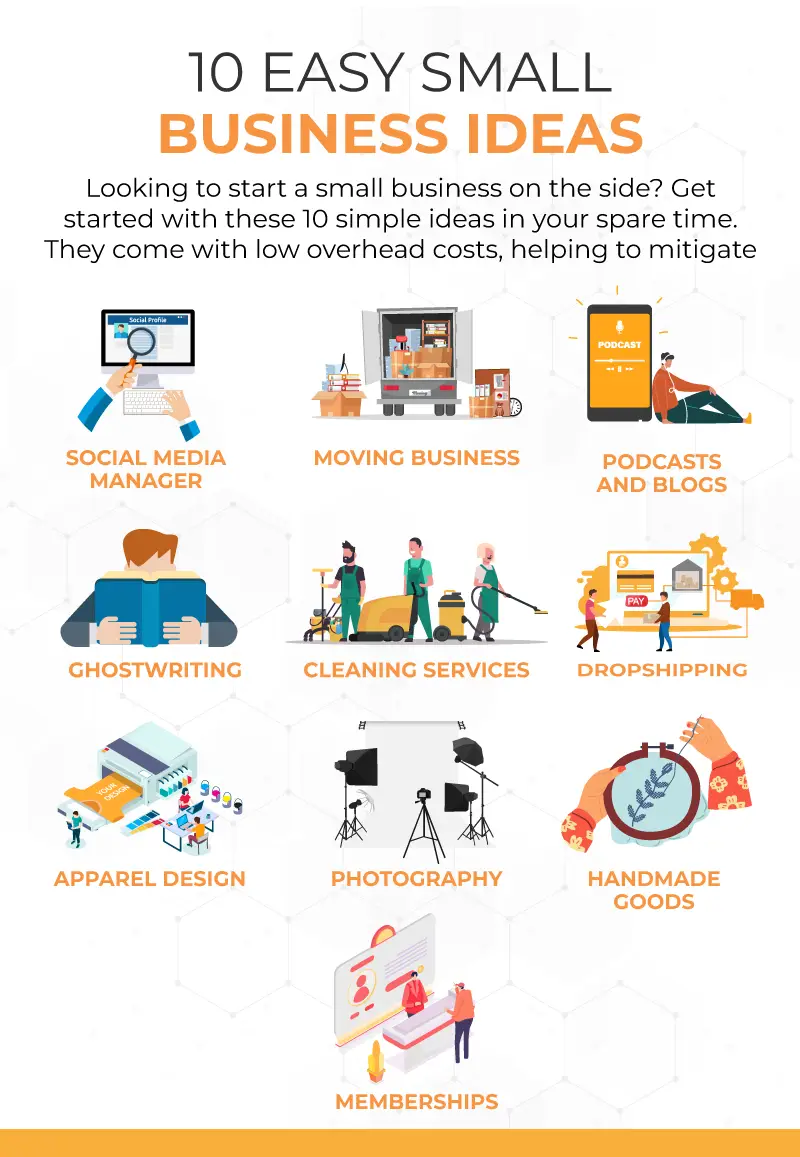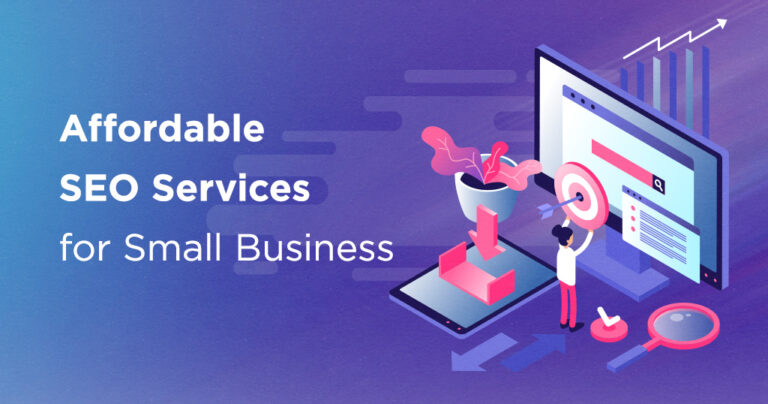Best Small Business Ideas For Entrepreneurs
Every year, approximately 600,000 small businesses open in the United States alone, showcasing a booming entrepreneurial spirit. So, what’s driving these aspiring entrepreneurs? It’s often the allure of innovative ideas, carving niche markets, and the desire to solve everyday problems with unique solutions that propel them into the business world.
Historically, small businesses have played a pivotal role in driving economic growth, with more than 50% of the workforce employed by them globally. Today, the best small business ideas are those that merge technology and creativity, reflecting society’s evolving needs. From personalized online retail shops to trendy gourmet food trucks, the potential to cater to varied customer bases is immense. The key lies in identifying gaps in the market and offering solutions that are both scalable and sustainable.

Best small business ideas for entrepreneurs
Starting an online retail store is a great choice for budding entrepreneurs. This business idea allows you to reach customers worldwide with the click of a button. With platforms like Shopify or Etsy, setting up an online store is easier than ever. By offering unique products or focusing on niche markets, you can attract loyal customers. Plus, the overhead costs are often lower compared to a physical store.
A food truck business is another exciting option for those who love to cook. This mobile venture lets you bring delicious meals to various locations. You can cater to events, festivals, or even busy office areas. By offering a unique menu or fusion cuisine, your truck could become a local favorite. Operating a food truck is also a fantastic way to test different markets.
Social media consultancy is in high demand as businesses need to strengthen their online presence. If you’re good with platforms like Instagram or TikTok, this could be your avenue. Entrepreneurs can help companies with content creation, user engagement, and ad campaigns. Many small businesses lack the time or expertise to handle social media on their own. By guiding them, you provide a valuable service.
Starting as a personal fitness trainer is perfect for those passionate about health. People are more health-conscious now than ever before. This role involves creating workout plans and offering dietary advice. Fitness trainers can work in gyms, parks, or even online. The demand for customized fitness solutions makes this a rewarding small business idea.
1. Online Retail Store
An online retail store is a versatile business idea that can cater to a vast audience. With the rise of e-commerce, buying and selling products online has become more accessible than ever. Platforms like Amazon and eBay allow sellers to reach customers globally. You can choose to sell handcrafted items, vintage clothing, or electronic gadgets. The options are limitless, and you can tailor your store to suit your interests.
Starting an online retail store involves some key steps. First, decide on the type of products you want to sell. Next, build a user-friendly website to showcase your offerings.
- Choose a reliable e-commerce platform.
- Establish a secure payment system.
- Develop a marketing plan.
These steps will help you attract and retain customers.
Marketing is essential to drive traffic to your store. Social media platforms like Facebook and Instagram are fantastic tools for promoting your products. Email newsletters can also keep your customers informed about new arrivals and special offers. Engaging with your audience through these channels helps build brand loyalty. Moreover, offering great customer service is crucial for online retailers.
The benefits of an online retail store are numerous. You can operate the business from anywhere with an internet connection. This flexibility makes it suitable for different lifestyles. Additionally, lower overhead costs compared to brick-and-mortar stores can result in higher profit margins. With dedication and creativity, your online store can thrive.
2. Food Truck Business
A food truck business offers a flexible and exciting way to bring delicious food to different locations. This mobile kitchen allows you to test new markets without the commitment of a permanent space. Whether you serve tacos, gourmet burgers, or vegan delights, your truck can cater to diverse tastes. Events, festivals, and busy downtown areas offer prime spots for business. The mobility of a food truck adds a fun element to your culinary offerings.
Starting a food truck involves careful planning. First, decide on your menu, which should be unique and appealing. Then, obtain the necessary licenses and permits to operate legally.
- Sourcing a reliable truck outfitted for cooking.
- Purchasing quality ingredients regularly.
- Creating a branding strategy for your truck.
These steps will set the foundation for your food truck’s success.
Marketing your food truck is essential for attracting customers and building a loyal base. Using social media platforms, you can share your daily locations, special menu items, and customer testimonials. Creating an eye-catching design for your truck also helps attract curious passersby. Engaging with your customers and receiving feedback can lead to improvements and menu enhancements. Consistent quality and friendly service are key in this fast-paced industry.
The advantages of a food truck business are many, including lower startup costs compared to traditional restaurants. You can easily change locations based on where the demand is, allowing flexibility and creativity. The ever-growing popularity of food truck culture provides a lively atmosphere for food lovers. Building connections in communities and creating memorable experiences can make your food truck a local favorite.
3. Social Media Consultancy
Social media consultancy is a thriving business for those who know their way around platforms like Facebook and Instagram. Many small businesses need help to promote their products and engage with customers online. As a consultant, you provide strategies to increase their online presence and grow their audience. This involves creating content, managing interactions, and analyzing the performance of social media campaigns. Your expertise can turn followers into loyal customers for these businesses.
Setting up a social media consultancy involves certain steps. Begin by understanding different social media tools and algorithms. Then, identify your target clients, which might include local shops, restaurants, or independent artists.
- Create a professional website to showcase your services.
- Develop a portfolio with examples of your work.
- Offer packages for different budget levels.
These steps help establish your credibility and attract clients.
Effective communication is key when working as a social media consultant. It’s important to understand the client’s brand and voice to maintain consistency. Regular updates on campaigns and their progress keep clients informed. Providing detailed reports with insights and suggestions for improvement can add value to your service. Building strong relationships with clients enhances trust and can lead to long-term collaborations.
The demand for social media consultancy is growing as businesses recognize the need to be active online. This role allows for creativity in developing unique content tailored to each client’s needs. It also offers the flexibility to work from anywhere, making it ideal for those who want to manage their schedules. By continually learning and adapting to changes in digital trends, consultants can provide cutting-edge solutions. Being proactive and innovative is key in this dynamic field.
Providing educational workshops or training sessions on social media is an excellent way to expand your services. Teaching employees how to effectively manage a business’s social media can empower them and improve overall efficiency. Workshops can be offered online or in person, catering to a wider audience. With businesses eager to remain competitive, offering such training can set your consultancy apart. This additional service is a win-win for both your consultancy and your clients.
4. Personal Fitness Training
Personal fitness training is ideal for those who are passionate about health and helping others. Trainers provide personalized workout plans and motivation to achieve fitness goals. With more people focusing on health, demand for personal trainers is on the rise. You can work in gyms, parks, or even offer online sessions for convenience. Training sessions can be tailored to different fitness levels and needs.
Getting started as a personal trainer requires certain certifications. These credentials ensure that you have the right knowledge to guide clients safely. Building a reputation in this field involves demonstrating expertise and understanding client needs.
- Develop a fitness program with clear objectives.
- Stay updated on the latest fitness trends and techniques.
- Network with gym owners and other trainers.
These actions help you grow your clientele.
Marketing your services effectively is crucial. Social media platforms are a great way to showcase success stories and client testimonials. Providing free classes or workshops can attract new clients and build community reputation. Offering flexible packages can cater to various budgets and schedules. Engaging content, such as workout tips and health advice, can draw attention to your services.
The advantage of personal fitness training is the direct impact you can have on someone’s life. Watching clients achieve their goals and improve their well-being is rewarding. This career offers flexibility, allowing trainers to manage their schedules. It also allows for creativity in designing unique and fun workouts. As a personal trainer, you build connections and inspire others to lead healthier lifestyles.
To enhance your service, consider offering nutrition advice. Clients often have questions about diets that can support their fitness goals. By providing tailored nutrition advice, you add value to your training sessions. Organizing group training sessions or challenges can also increase client engagement. These initiatives can foster a sense of community and improve client retention.
5. Unique Art and Craft Sales
Unique art and craft sales provide a creative outlet for artists and crafters to display their talents. Selling handmade items like jewelry, pottery, and paintings can reach art lovers locally and globally. Online platforms such as Etsy or Amazon Handmade make it easy to set up a shop and reach customers worldwide. This business allows artisans to share their unique creations and connect with an appreciative audience. The personal touch of handmade items adds to their appeal.
Crafting a successful art and craft business involves a few key steps. First, identify your niche or speciality, which could include specific art styles or materials. Then, develop a distinct brand that represents your individual artistry.
- Create a visually appealing store with clear product images.
- Participate in local craft fairs and exhibitions.
- Engage with potential customers through social media.
These strategies can help establish your presence in the art world.
Marketing your art effectively increases visibility and attracts buyers. Social media is a powerful tool for sharing your creative journey, showcasing new works, and connecting with fellow artists. Collaborating with influencers or joining online art communities can expand your reach. Organizing workshops or live sessions demonstrates your skills and engages your audience. A blog about your craft experiences could also draw interest and provide additional insights to potential buyers.
The benefits of a unique art and craft business include the joy of creating and the satisfaction of sharing your work with others. It offers flexibility, allowing you to balance your creative pursuits with other commitments. Selling art and crafts can also build valuable relationships with customers and other artists. Additionally, customized products and personalized items create memorable experiences for buyers. This business blends artistry with entrepreneurship to promote and sustain creative expressions.
Expanding your offerings to include craft kits or DIY tutorials can further enhance your business. These products allow customers to try creating their own pieces, broadening your market. Providing these kits can foster creativity and interest in the crafting process. Hosting virtual crafting sessions or classes adds another dimension to your sales. These opportunities can strengthen your brand and encourage repeated engagements.
Factors to consider when selecting a small business idea
Choosing a small business idea requires you to consider your interests and skills. Starting a business that matches your passion can keep you motivated and committed. Skills also play a role in running the business efficiently. Analyze what you enjoy doing and where your expertise lies. This assessment can guide you toward an idea that is both satisfying and manageable.
Understanding market demand is crucial before diving into any business venture. Research current trends to see what’s popular or gaining traction within different industries. Identifying gaps in the market can present opportunities for unique services or products.
- Survey potential customers about their needs.
- Check competitors offering similar solutions.
- Evaluate the long-term viability of the demand.
This research ensures your business concept has potential for success.
The financial aspect is another important factor to think about when selecting a business idea. Calculate initial startup costs, which include materials, marketing, and any needed equipment. Consider how much capital you have and what funding options might be available, like loans or investors. A clear understanding of expenses helps create realistic financial expectations. Proper budgeting ensures you’re prepared for both start-up needs and ongoing operations.
Your lifestyle preferences should align with the type of work you’ll be doing daily in your new venture. Some businesses require more travel or longer hours than others do. Evaluate how much time you’re willing to dedicate and whether you’d like flexibility in your schedule. Balance between work commitments and personal life leads to better job satisfaction. Being honest about these desires helps avoid future burnout.
Selecting a location can significantly impact certain small businesses’ performance, especially those reliant on foot traffic or specific demographics gathered geographically. Whether it’s setting up shop physically nearby target consumers or choosing an online platform by assessing digital competition levels—location matters greatly! Identify key areas where customer interactions are most frequent relative cost-effectiveness geographically-wise alongside potential growth expansion plans eventually downline known already proactively set previously decided upon during strategic planning phase earlier still plays influential roles second thoughts arise disputed mistaken otherwise without fail henceforth always watchful keen considering cautiously together methodically prior proceeding decision-making progressions undertaken successfully similarly adapting thoughtful approaches continuously throughout ensuring guidance pursued aligned remained observed all times predictably!
Key resources for starting a small business
Starting a small business involves gathering key resources that pave the way for success. One essential resource is a solid business plan. This document outlines your goals, marketing strategies, and financial projections. A plan helps identify potential challenges and solutions. Crafting a clear business plan is crucial in steering your startup in the right direction.
Financial resources play a significant role in bringing your business idea to life. Initial funding is necessary for purchasing equipment, inventory, and covering operating expenses. Options like personal savings, bank loans, or even crowdfunding platforms are available.
- Explore grants or small business loans.
- Consider partnerships to share financial responsibility.
- Look into angel investors interested in your industry.
Having a financial strategy ensures that your business can develop and grow.
Getting the right tools and technology aligns your business with modern demands. Whether it’s software for accounting, design tools for marketing materials, or apps for managing projects, technology streamlines operations. Investing in the right technology enhances productivity and efficiency. Staying updated with the latest tech trends keeps your business competitive. Equipping your business with the right tools is an invaluable step.
Support networks, such as mentors or business groups, offer guidance and advice. Having a mentor to lean on can provide insights from their experiences. Networking with other small business owners allows knowledge sharing and problem-solving. Participating in local or online business communities can also open up opportunities. A strong network can offer the support needed to thrive in a competitive business landscape.
Legal and regulatory resources ensure compliance with laws. Having access to legal advice protects against potential issues related to contracts or intellectual property. Research permits and licenses specific to your industry, as they vary depending on location and business type. Consulting experts in law can help navigate these complexities. Proper legal groundwork secures your business’s future.
Success stories of small business entrepreneurs
There are countless inspiring success stories of small business entrepreneurs who have made a difference. One such story is Sarah, who started a home-based bakery. Using family recipes and a passion for baking, she began selling her creations at local markets. Through word of mouth and social media, her orders skyrocketed. Now, Sarah runs a popular bakery in her community, employing several staff members.
Another remarkable story involves Sam, who launched a tech startup from his garage. He developed an app that simplifies household chores by connecting users with local service providers. Initially, Sam faced challenges in getting it noticed. However, with persistence and smart marketing strategies, the app gained popularity. Today, it’s widely used, transforming how people manage tasks at home.
Emma’s story is one of resilience and vision. She noticed a lack of sustainable fashion options and decided to change that. Emma founded an eco-friendly clothing brand, focusing on ethical production practices. Her dedication caught the attention of environmentally conscious consumers. Now, her brand is recognized internationally, setting a trend for responsible fashion.
John, a former teacher, turned his love for education into a booming business. He created an online tutoring platform that connects students with experienced tutors. Initially serving just a few local schools, his platform now reaches learners globally. John’s emphasis on quality education and flexibility has fueled its rapid growth. His success demonstrates the power of combining passion with technology.
One unique story is that of Mira, who started a pet-sitting service in her neighborhood. Observing a demand for pet care while owners travel, she filled this niche successfully. Mira’s business expanded into offering additional services like grooming and training. Her personalized care approach has built a loyal client base. Mira’s commitment to animal well-being has earned her business recognition.
Trends in small businesses
Small businesses are continually evolving with new trends shaping the landscape. One major trend is the emphasis on sustainability and eco-friendly practices. Many entrepreneurs are creating products that minimize environmental impact. This shift towards green businesses attracts consumers who prioritize sustainability. It also encourages companies to innovate in their production processes.
Technology continues to be a driving force in small business trends. Businesses are adopting digital tools to enhance efficiency, from cloud computing to customer relationship management (CRM) software. Online presence through social media and e-commerce platforms has become essential.
- Investing in user-friendly mobile apps.
- Utilizing data analytics for market insights.
- Implementing virtual payment systems.
These tech advancements are leveling the playing field for small businesses.
Another growing trend is remote work and flexible scheduling in the workplace. Small businesses increasingly offer work-from-home options and adaptable hours. This flexibility appeals to employees seeking better work-life balance. It also provides companies access to a wider talent pool beyond their geographical area. Adapting to this trend can enhance employee satisfaction and retention.
Personalization in customer service is becoming key for small businesses. Consumers prefer experiences that cater to their specific needs and preferences. Businesses are using data-driven approaches to offer customized product recommendations. Engaging directly with customers through personalized marketing enhances brand loyalty. This trend empowers businesses to build stronger relationships with their clients.
Diversity and inclusivity have gained emphasis in small business practices. Entrepreneurs are focusing on creating inclusive environments that reflect varied perspectives. Diverse teams bring fresh ideas and foster innovation. Businesses prioritizing inclusivity are attracting a broader customer base. This trend not only boosts brand reputation but also drives market growth.
Final Thoughts
Choosing the right small business idea is crucial for long-term success. By considering your interests, market demand, and available resources, you can find a niche that aligns with your goals. As trends evolve, staying adaptable and innovative will keep your business competitive.
Remember, each success story started with an idea and the courage to pursue it. Whether it’s through offering unique products, leveraging technology, or creating sustainable practices, the opportunity for growth is vast. With dedication and passion, your small business can thrive and make a meaningful impact.


